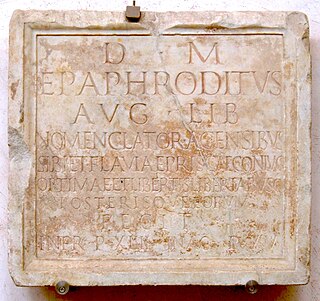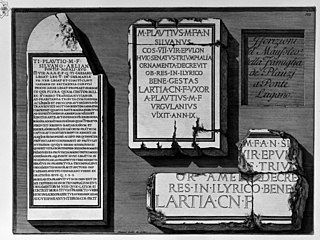Related Research Articles
In Greek mythology, Aeolus or Aiolos is a name shared by three mythical characters. These three personages are often difficult to tell apart, and even the ancient mythographers appear to have been perplexed about which Aeolus was which. Diodorus Siculus made an attempt to define each of these three, and his opinion is followed here.
Gnaeus Domitius Afer was a Roman orator and advocate, born at Nemausus (Nîmes) in Gallia Narbonensis. He flourished in the reigns of Tiberius, Caligula, Claudius and Nero. He was suffect consul in the nundinium of September to December 39 as the colleague of Aulus Didius Gallus.
Lucius Afranius was an ancient Roman comic poet who lived at the beginning of the 1st century BC.
Acoetes was the name of four men in Greek and Roman mythology.
Aegle is the name of several different figures in Greek mythology:

Tiberius Claudius Epaphroditus or Epaphroditos, was a freedman and secretary of the Roman Emperor Nero. He was later executed by Domitian for failing to prevent Nero's suicide.
In classical Greek and Roman mythology, Abarbarea is the name of two nymphs:
Aepytus can refer to several people in Greek mythology:
Marcia Servilia or commonly known as Servilia was the daughter of Roman Senator Barea Soranus. Her father was part of the Stoic Opposition who opposed Nero's tyrannical rule. When he was sentenced to death by Nero in 65 or 66, Servilia was similarly accused and sentenced to death on a charge of consulting sorcerers supposedly to find out her father's fate.

Acerronia Polla was a servant and friend of Agrippina the Younger, the mother of Nero. She was drowned in AD 59, when an unsuccessful attempt was made at the same time to drown Agrippina. She may have been the daughter of Gnaeus Acerronius Proculus, consul in AD 37.
Gnaeus Acerronius Proculus was a consul of the Roman Empire in 37 AD, with Gaius Petronius Pontius Nigrinus as his colleague; that was the year Tiberius died.
Acraea was a name that had several uses in Greek and Roman mythology.

Tiberius Plautius Silvanus Aelianus was a Roman patrician who twice served as consul, in 45 and 74 AD. He was the natural son of Lucius Aelius Lamia and the adopted son of Marcus Plautius Silvanus, brother of Plautia Urgulanilla, first wife of the emperor Claudius. It is known he offered up the prayer as pontifex when the first stone of the new Capitol was laid in 70 AD. In some ancient sources he is referred to as Plautius Aelianus, but we learn from an inscription that his full name was Tiberius Plautius Silvanus Aelianus, and that he held many important military commands.
Agetas of Callipolis was commander-in-chief of the Aetolians in 217 BC, during which year he made an incursion into Acarnania and Epirus and ravaged both countries. For this accomplishment, he received the honor of a statue in the city of Lamia. Agetas also fought in the Macedonian Wars, and served as strategos again, succeeding Dorymachus around the start of the 2nd century. In 200, he was the strategos who met with a Roman diplomatic trio consisting of Gaius Claudius Nero, Publius Sempronius Tuditanus, and Marcus Aemilius Lepidus.
Alcimenes can refer to a number of people in Greek mythology and history:
The name Alcon or Alco can refer to a number of people from classical history:
Aleuas or Alevas can refer to more than one person from ancient Greek myth and history:
Alexander of Aegae was a Peripatetic philosopher who flourished in Rome in the 1st century AD, and was a disciple of the celebrated mathematician Sosigenes of Alexandria. He was tutor to the emperor Nero. He wrote commentaries on the Categories and the De Caelo of Aristotle. He had a son named Caelinus or Caecilius. Attempts in the 19th century to ascribe some of the works of Alexander of Aphrodisias to Alexander of Aegae have been shown to be mistaken.

Andromachus was the name of two Greek physicians, father and son, who lived in the time of Nero.
The gens Aponia was a Roman family during the later Republic, and the 1st century of the Empire. The gens is known from only a few individuals.
References
- ↑ Tacitus, Annales xv. 45, xvi. 23
- ↑ Smith, William (1867), "Acratus", in Smith, William (ed.), Dictionary of Greek and Roman Biography and Mythology , vol. 1, Boston, MA, p. 14
{{citation}}: CS1 maint: location missing publisher (link)